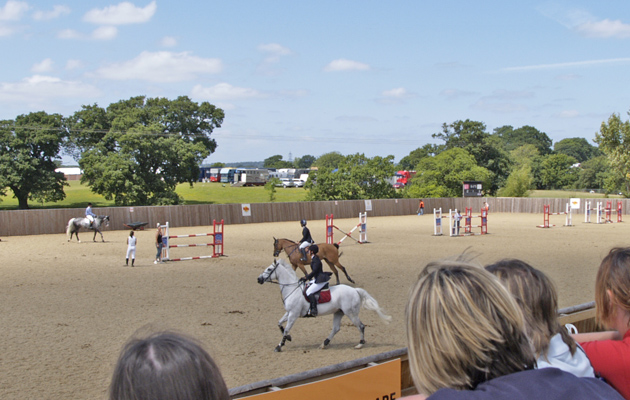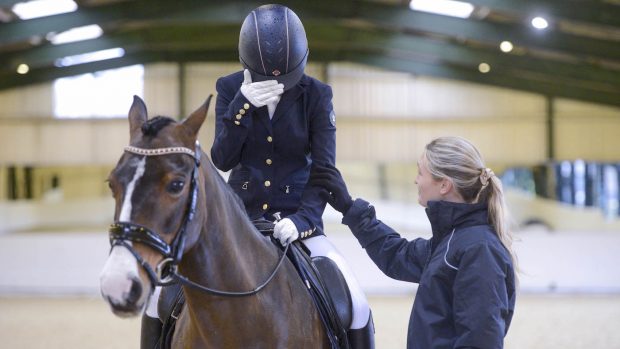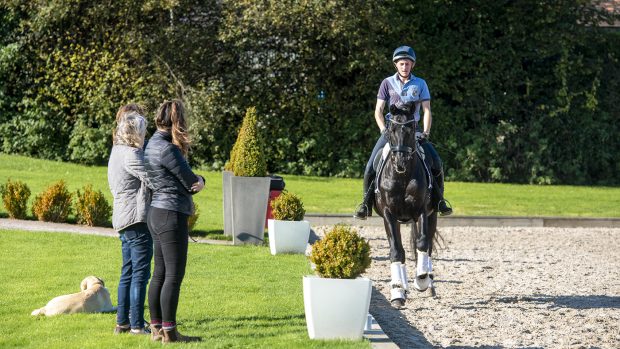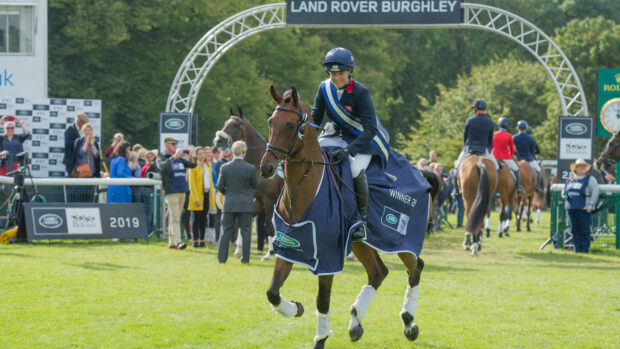Sports psychologist Inga Wolframm's book Perfect mind: Perfect ride tackles all aspects of getting in the right mindset for riding. Here she gives her expert advice for coping with competition day
You trained for it, looked forward to it, perhaps you’ve even dreaded it (at least deep down). Now it is finally here — competition day! And that can only mean one thing: it’s show time.
But let’s face, even though you enter a show out of your own free will, it can be something of a double-edged sword: the potential for lots of fun and utter humiliation combined in one neat package. At least that’s what that inner voice will keep telling you unless you teach it to do otherwise.
1. Learn to love it
A little flutter of nerves can be a very good thing. It makes you quicker in your reactions, helps you to focus on what matters most, prevents you from tiring easily and even makes you feel less pain. Rather than condemn it, welcome it. Appreciate that it’s the sign your body needs to pull out all the stops.
2. Remind yourself that you can do it
One of the conditions of being able to turn anxiety into a feeling that’s positive and helpful is to know you’ve got the relevant skills. How do you know? By having done it at home. And if you want to be absolutely sure you’ve got what it takes, make sure you train above the level you’re planning to compete at.
3. Don’t try and control the uncontrollable
Many people consider this the number one rule of mental skills training. All it means is that there is absolutely no point in worrying about the things that you can do nothing about on the day of the show. Focusing on elements outside of your control is wasted energy that you’d be better off spending on more important things, such as…
4. …controlling the controllables
It starts with seemingly mundane things such as having your times, your kit, the routine of how and when to tack up. Enough things can go wrong without your planning being one of them. So make sure you’ve got everything you need ready well before you leave. Also think of things that might go wrong when you get there, such as the zip of your boot breaking or the weather changing just as you get there. While you can’t plan for every eventuality, having a ‘just in case’ kit stored away in your car or lorry will give you additional peace of mind.
5. Set yourself goals
Remember, the best way to stay in control is to know exactly what it is that you want to achieve and how you are going to go about it. You want to ride a quiet test? Focus on keeping your joints (wrists, ankles, shoulders, etc.) supple and your muscles (upper arms, upper legs and so on) relaxed and ‘off’ the horse until you need to give an aid. You want to ride with more expression? Keep making sure your horse is ‘on’ the aids. Most importantly? Don’t just focus on these goals in your warm-up, but keep reminding yourself of what you want to do while in the ring too.
6. KISS – Keep it simple and specific
Try KISS – keep it simple and specific. Simplicity and specificity are key to knowing what you are supposed to be doing. So as you get on your horse, give yourself simple and specific instructions on how you intend to ride your test, the course, etc. You want your horse to be relaxed in the ring? Instruct yourself to loosen up through the shoulders and wrists. Your horse needs to move forward with more impulsion? Be adamant that your horse reacts to your leg the entire time while in the ring.
7. Distract yourself
Do you worry yourself silly about all the things that might go wrong in the ring? Can you picture everyone laughing their heads off at your poor performance? Are you convinced the judges hate your horse? Rest assured, these thoughts are normal – most riders experience them at one time or another. But they’re also unproductive and quite often end up undermining your performance. Rather than desperately trying not to think them though (which hardly ever works anyway), it’s best to simply try and accept that you do (something along the lines of ‘Hey, it’s part of who I am, but I’m not going to let it affect me.’) After that, move on and find something to do to take your mind off those negative thoughts. Playing a game on your smart phone, gossiping with a friend, and, while on board, focusing on what you are going to do and breathing correctly can work wonders.
8. Ignore others
I don’t mean all the time, of course. But while you’re tacking up, or already on your horse, you shouldn’t be watching or paying attention to anyone else, be that fellow competitors, judges, spectators. You can’t control them anyway – not what they’re doing or thinking, not what they’ll say to each other and not how they’ll score your test. Incidentally, it’s not always a good idea to watch other competitors beforehand either. If you only end up comparing yourself unfavourably, you should definitely leave it until after you’ve ridden.
9. Breathe!
Ever asked yourself how come you can ride for an hour at home without breaking into a sweat, but a few minutes in the ring leave you completely knackered? It’s because you forgot to breathe. Many riders will hold their breath for long periods in the ring, and, when they finally do take a breath, inhale into their chest cavity. The problem is, this type of – chest – breathing is very closely linked to the ‘fight or flight response’. Breaths are short, shallow and jerky. Muscles are tight, tense and ready to jump into action – not ideal when you’re doing a sport that, first and foremost, depends on fine motor control (i.e. small, very precise movements of your muscles). The answer? Remember to breathe into your belly, taking long, slow breaths.
10. Relax
Managed to control your breathing and need a bit more a challenge? All right, here goes. Work on relaxing your muscles on command. It’s important to first start practising at home, though. Work your way through all the major muscle groups in your body, one after the other. First, tense them as hard as you can, then simply let go – and feel the tension drain from your muscles. Combine with a trigger word, such as relax or chill. Eventually, your trigger and relaxation will become inseparable. Once you get to the show, repeat your trigger word as and when needed to remove any superfluous tension that might (will) distort communication with your horse.
11. Listen
The power of music — don’t underestimate it. The right tune can relax, stimulate, motivate, soothe, provide comfort or remind you of happy days. So why not come up with a competition play list? You’ll be able to magic yourself into the right state of mind at the mere touch of a button.
12. Focus
It’s one of the key elements to performance. Being able to focus. Attention, the right kind of focus, flow. When it happens, it’s magical. Creating it is merely a question of practice. Remember, focus is a bit like the beam of a torch, highlighting merely those elements important to your performance, but leaving everything else in the dark. Especially if you’re struggling to get into that focusing zone, you might want to make use of a trigger word or a pre-competition routine, which your body will automatically associate with the right kind of focus.
13. Use a routine
Using a series of pre-determined positive (!) behaviours, actions or thoughts that your body and mind have learned to associate with another set of actions, moods or behaviours, will always, without fail, provide you with a sense of security. Routines can involve anything from the type of music you listen to on your way to the show, the way you tack up your horse or the way you structure your warm-up. Just before you enter the ring, you might also want to run through a set behaviour, words or phrases, such as a short gesture meaningful only to you, a deep breath, a trigger word, a visualised scene, and, finally, the command for your horse to get going. As long as the routine is positive, helpful and enjoyable, you’re good to go.
14. Be nice to yourself
Riders are possibly the most critical group of people I’ve ever come across. And that’s a good thing too – when you’re sitting on top of an animal with a mind of its own, you can’t afford to be complacent. But if being critical about yourself is all you do at a show, you’re missing the point… Too many riders keep telling themselves that they are ‘rubbish’, that they ‘don’t belong’, that they ‘might as well go home’. This kind of behaviour serves absolutely no purpose other than undermining your confidence (which is the last thing you need!). So try and be nice to yourself by complimenting yourself. And if you cannot bring yourself to come up with a compliment, at least think of something constructive to say!
15. Visualise
You might have been doing it for years without realising that it’s one of the most effective mental skills around: imagery. The ability to see yourself ride in your mind’s eye. But now that you know it works, it might be time to make the most of it. Use it to improve on current levels of skill, by seeing yourself perform a tricky movement. Or motivate yourself by imagining yourself perform faultlessly at the top of your game. Or picture yourself calm and serene, in the right mental frame of mind. By visualising a desired outcome you’re giving your mind and muscles a kind of ‘blueprint’ for the real action later on.
16. Forgive yourself
So you’ve made a mistake. Big deal… Seriously, even though it might feel like it at that particular moment, getting it wrong isn’t the end of the world. If you’re half way through your ride, give yourself positive instructions on what to do next. Afterwards, remind yourself that this was just another competition (no matter how important it was), and that you’ll simply work on it over the next few weeks. If this doesn’t sound acceptable to you, check your assumptions. You might be trapped in a dysfunctional thought pattern. So rather than making unreasonable demands of yourself, try and learn from your mistakes. Lastly, think of the big picture. You’re there, because you want to be.
17. Accept it
There’ll always be days when things just refuse to come together. It’s not your fault. In fact, it’s nobody’s fault. In the words of Mary King: “Highs and lows are part of horse sports. Try and simply accept them.”
18. Enjoy it!
You’ve trained, you’ve prepared, you’ve spent lots of money and put in oodles of time. Most importantly though, at the heart of it all, it’s about you and your horse.
- To stay up to date with all the breaking news throughout major shows such as London International and more, subscribe to the Horse & Hound website
You may also be interested in:
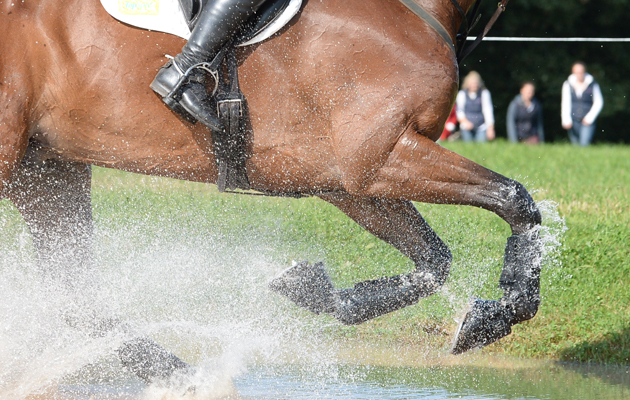
‘Remember you’re dealing with an unpredictable animal’ — how top riders cope when things go wrong

Subscribe to Horse & Hound magazine today – and enjoy unlimited website access all year round
